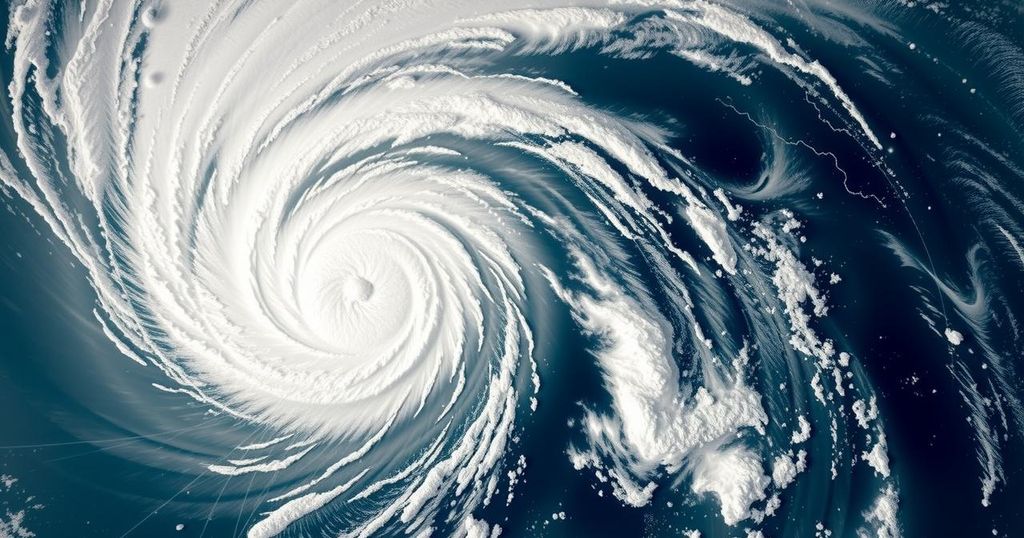Tropical Cyclone Chido Causes Severe Destruction in Mayotte and Approaches Africa

Tropical Cyclone Chido has caused extensive damage in Mayotte, with wind speeds exceeding 220 km/h. The cyclone is moving toward eastern Africa, particularly Mozambique, raising concerns for millions at risk. Authorities are mobilizing emergency services while previous storms have highlighted the humanitarian crises linked to climate change in the region.
The French territory of Mayotte in the Indian Ocean has experienced severe devastation due to Tropical Cyclone Chido, which is currently moving towards the eastern coast of Africa. The storm exhibited wind speeds exceeding 220 kilometers per hour, leading to significant destruction including the removal of roofs from buildings. Fortunately, there have been no immediate reports of casualties, although many residents have endured considerable loss.
Mayotte Prefect Francois-Xavier Bieuville characterized the cyclone as the most violent in nearly a century and declared a state of emergency to facilitate rescue operations after the storm’s immediate threats diminished. Although the highest alert has been lifted, the general populace remains under a red alert, with advice to stay indoors in safe shelter.
In response to the aftermath, French Interior Minister Bruno Retailleau confirmed substantial damage across the region and indicated that emergency services are fully engaged. Reports indicated widespread power outages, structural damage to homes, and the uprooting of numerous trees. To augment local efforts, 110 rescuers from mainland France and the nearby island of Reunion are currently deployed, with an additional contingent of 140 en route.
Cyclone Chido is also impacting the nearby Comoros Islands, where authorities have implemented strict safety measures including closing airports and ordering ships to remain docked. Additionally, concerns are rising for a group of fishermen who disappeared at sea before the cyclone struck.
As Chido progresses towards the mainland, it is anticipated to reach Mozambique late Saturday or early Sunday, potentially affecting approximately 2.5 million individuals in the northern provinces. Nearby nations, including Malawi and Zimbabwe, are bracing for possible flooding and are advising residents in vulnerable areas to relocate to higher ground.
The cyclone season in the southeastern Indian Ocean, spanning from December to March, has witnessed an alarming trend of increasingly potent storms in recent years. Historical events such as Cyclone Idai, which resulted in over 1,300 fatalities in 2019, and the devastating Cyclone Freddy in 2022 further underscore the looming threat posed by these climatic events. Experts highlight that climate change is exacerbating the severity of cyclones, disproportionately affecting impoverished nations in southern Africa, which have minimal contributions to global climate change.
Tropical cyclones are significant weather events that occur during specific seasons, typically from December through March in the southeastern Indian Ocean. These storms pose various risks, including high winds that can lead to structural damage, flooding, landslides, and increased vulnerability to waterborne diseases such as cholera. Historically, cyclones in this region have resulted in devastating humanitarian crises, particularly in nations that contribute little to the causes of climate change. The growing intensity of these storms is linked to climate change, raising concerns about their implications for poorer countries in southern Africa.
In summary, Tropical Cyclone Chido has inflicted catastrophic damage upon Mayotte, prompting emergency responses and ongoing safety measures. As the cyclone progresses toward the African mainland, the threat of widespread impact increases, particularly in Mozambique and surrounding nations. The alarming trend of escalating cyclone severity due to climate change warrants urgent attention, especially regarding the humanitarian challenges faced by affected regions.
Original Source: www.voanews.com








